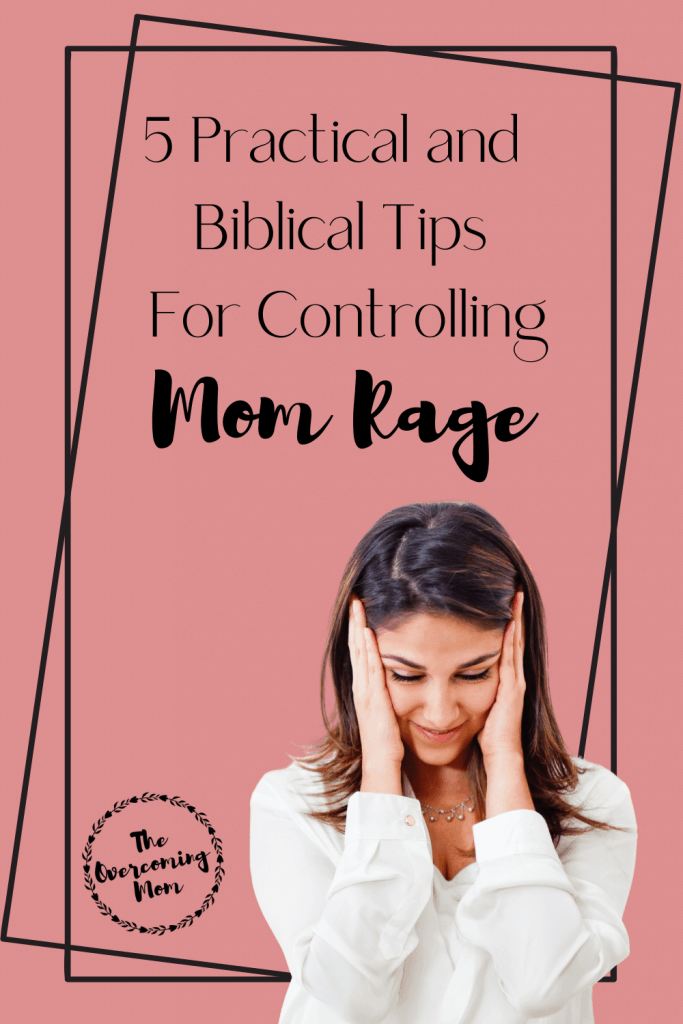This page may contain affiliate links. As an Amazon Associate I earn from qualifying purchases. If you want more information, please see my Affiliate Disclosure.

My toddler son and I love to go to the park, especially to the swings. As soon as we get to the park, he usually cries for the swings. One day I put my son in the swing and began pushing, but then he started crying. I asked my son what was wrong, and he kept saying, “Swing, Swing!” I was confused, so I asked more questions, which lead to more crying. After several minutes of on and off crying, I lost it! I became that mom who yells at their two-year-old in public. I shamefully walked my son away from the swing and spent the rest of the day embarrassed of my existence. This was my harsh introduction to mom rage.
I’ve experienced several moments of mom rage since then. Sometimes I would keep it under control, and just seethe in anger on the inside, and sometimes I would explode by yelling at my husband or my son. Afterwords I would feel horrible shame, and spend the rest of the day wondering if I were really cut out for motherhood. I felt all alone in this struggle until I stumbled upon a social media conversation about mothers struggling with rage as well. I read story after story of moms experiencing the same trigger-rage-shame cycle I found myself in. This led me on a path of attempting to understand why moms experience rage, and how we can conquer it using practical techniques and Biblical wisdom.
Related: “Things To Remind Yourself When You Feel Like A Bad Mom“
What is “Mom Rage?”
“Mom Rage” is a term that encompasses the intense anger moms feel in stressful situations. Oftentimes it is set off by some form of trigger, such as a dirty house, tantrums, disagreements with spouses, and many other stressors. To some extent, some believe “mom rage” is a made-up term, but with the rise of moms experiencing rage (especially during the COVID-19 pandemic), professionals are beginning to see this as a true issue that needs to be addressed.
If you are experiencing rage postpartum (remember postpartum can be any time between birth-2 years) then it is possible to be diagnosed with Postpartum Rage. Perinatal mood disorders are the #1 reported complication of childbirth, a postpartum rage is one of them. Symptoms of postpartum rage include:
- struggling to control your temper
- increased amount of screaming or swearing
- physical expressions like punching or throwing things
- violent thoughts or urges, perhaps directed at your spouse or other family members
- dwelling on something that made you upset
- being unable to “snap out of it” on your own
- feeling a flood of emotions immediately afterwards
Many times, moms will brush off symptoms of mom rage by saying they’re just tired, or hormonal. Societally, women have had their symptoms of rage pushed aside. They’ve been told to be more grateful, or that good moms don’t get angry. To put it plainly, that’s a lie. Any mom can experience moments of rage, even women who usually don’t get angry. Instead of shaming you into believing you’re less than simply for struggling with rage, I want to give you simple ways to combating mom rage .


1- Identify the “why” behind the mom rage
Often times, rage is a red flag that a need is not being met or that a personal boundary has been crossed. Identifying the trigger behind your rage can be a powerful tool in learning how to manage your rage.
- Physical needs not being met – Are you eating enough, getting enough sleep, or experiencing physical or emotional discomfort?
- Sensory needs not being met – Are you experiencing sensory overload, or even feeling understimulated by your environment?
- Having too long of a to-do list – Do you have way too much to do with no additional support?
- Meeting everyone else’s needs, but ignoring your own – Do you feel you lack self care?
- Having your feelings invalidated by loved ones – Do you feel like no one in your support network takes your feelings seriously?
- Feeling helpless in challenging parenting moments – Does your child’s behavior feel out of your control?
There are quite literally millions of ways rage can be triggered, but those are some common triggers moms can experience.
When you’re feeling anger bubble up in you, take a minute and assess what it is that’s causing the mounting anger. Are the kids being too loud? Did you eat? Have you had any water? Is the house cluttered? Did your spouse say something sassy to you? Did your child talk back to you? Identifying the trigger behind the rage is key to curbing it and bringing it to an end.
2- Find the need that needs to be met
Like I stated in the first point, rage is a red flag that a need is not being met in your life. So, what are the needs you have in life?
- Food and water (are you hungry or thirsty when you’re angry?)
- Sleep (do you get angry when you’re tired?)
- Sensory input (do too many noise, smells, touches, visual stimuli, or tastes set me off?)
- Entertainment (am I bored? Have I done so much entertainment that I’m overstimulated?)
- Emotional (do I feel loved? Do I feel validated? What other emotions might I be experiencing?)
- Functionality of your home (is my house dirty? Do I have too much on my to-do list?)
- Meeting our loved ones needs (do I feel like I’m not doing a good job as a parent and/or spouse?)
The need that needs to be met could be one of these, or multiple. Once you’re able to identify the need not being met, you can do what’s necessary to meet that need. That could be a simple as feeding yourself and drinking some water, or it could be having a conversation with your spouse about completing tasks around the house.
Another important point to make here is that when we get angry at our kids, it’s oftentimes not your kids you’re angry at. Many times, your anger is stemming from something else, and your kids happen to be on the receiving end of it. For example, if you feel like your house is a mess, and then your kids throw their toys everywhere, you may blow up at your kids for making a mess. The need in this situation that’s not being met is the functionality of your home, and your kids were on the receiving end of that need not being met. When we start looking at our triggers as needs needing to be met, we start taking the blame off of our kids or spouse and start putting it on external things that can be changed or modified. Doing this works wonders for moments we feel mom guilt as well.
Related: “5 Minute Self Care For The Christian Woman“
3- Assess your boundaries
Perhaps you’ve identified your triggers and assessed the needs that aren’t being met already. You’ve started taking active measures to meet those needs throughout the day, yet nobody else in your family seems to give you the time or the space to meet those needs. That sounds like a recipe for an explosion! This is where one of my favorite words come into play: BOUNDARIES!
Lets say one of the things that triggers your anger is being touched too often, and the need you need to meet is having alone time, but you can’t seem to get away from your kids long enough to have alone time. Then that is a sign you need to create a boundary. This could mean you need to create a “quiet time” for your kids during the day, or even put on a tv show while you sit in another room, or have a conversation with your spouse and create a plan for your alone time.
Creating a boundary with your family to ensure that your needs are being met isn’t selfish, it’s a sign of respect towards your family! You love and care for them so much that you want to ensure that you are your best around them, therefore you set a boundary to make sure of that. Don’t believe the lie that boundaries are selfish. All good relationships have healthy boundaries, and the relationship with your spouse and kids is no exception.
4- Create a “Mom Rage Plan”
After you’ve identified the why behind your rage, assessed the needs not being met, and assessed your boundaries, then you can create your “Mom Rage Plan”. This plan is your own personalized plan for how you will calm yourself when you feel rage bubbling up. It’s like creating a fire drill for your mind!
A Mom Rage Plan is what you plan on doing in the moments when you begin to feel angry. Let me give you an example:
Let’s say your house is an absolute mess, and it’s stressing you out. Then your toddler takes his box full of blocks and dumps it in the middle of the floor. You start to feel the anger bubble up, and you feel the unction to blow up at your child. Your “Mom Rage Plan” in that moment might be to take a deep breath and walk away from the mess. After taking a break from the mess, you come back and clean it up (or ignore it for later if you’re like me).
Here are some examples of some things you can do to calm yourself when you begin to feel angry:
- Walk away to a quiet place (bathroom, bedroom, kitchen, etc…) If you have “little shadows” and your kids follow you wherever you go, simply say “Mommy is having a big feeling, and I need some alone time. I’ll play with you in a few minutes”. Setting a timer for however long you’ll be in the other room can be useful for kids who struggle being separated from you. If there’s another safe adult in the house, then don’t be afraid to leave the house!
- Play some quiet, peaceful music. I like to play soft worship music when I’m stressed, but anything calming will do. Put on some headphones if you need to.
- Journaling. Keep a notebook nearby and write down what is making you upset. It’s like yelling, but quiet.
- Prayer and meditation. Taking even a minute and giving your frustration to the Lord can be all it takes to bring you calm.
- Practice some deep breathing. Taking deep breaths during highly emotional moments can be challenging. Learning how to calm your body with deep breaths can be a great tool for controlling your anger in a healthy way.
5- Give yourself just as much grace as God gives you
We all know the vicious cycle. Your child does something that’s frustrating, you try to fix it, they frustrate you more and more, until you explode. After you explode, you feel ashamed. Sometimes that shame lasts for the day, and sometimes it sticks around for so long that shame becomes your inner voice. Shame is a tool of Satan to keep you in dangerous, destructive patterns.
The good news is that every time you make a mistake, God offers His forgiveness and grace to you. All you have to do is ask for it. It really is THAT simple! The problem isn’t God’s ability to forgive us, it’s our ability to forgive ourselves. How often do we repent, then spend days and weeks still dwelling on what we did wrong? When we stop dwelling on what’s already been forgiven, we give ourselves permission to move on and grow from our mistakes.
God’s already forgiven you for your moments of rage, and more than likely, so has your family. Bring an end to your shame cycle, and forgive yourself. Give yourself grace. You’re a human, bound to make mistakes. But if God is quick to forgive you and help you through your struggle, you should extend that same grace to yourself.
Mom rage doesn’t have to last forever
Often times when we act on our angry moments, we automatically call ourselves the “mean mom” You may feel like the mean mom in the moment, but it doesn’t have to be that way! You will have moments when you feel anger bubble up in you, but when you take the time to discover the “why” behind the anger, you’ll see you’re not a mean mom, you’re a mom whose needs aren’t being met.
Getting comfortable with following any of these tips will take time and practice. It is not normal behavior to stop yourself in the middle of a rage moment and think, “why am I angry?”. It’s not normal behavior to stop yourself before you blow up and assess which needs in your life aren’t being met. These strategies will take time, practice, and patience!
If you find yourself having a hard time with rage, even with following these tips, I always recommend seeking professional help. Mental health professionals are trained in giving you tips on coping in tough moments, as well as helping you pinpoint exactly what it is you need in the moment.
Remember that mom rage doesn’t have to last forever, and this is something you can work on. It’ll take time, practice, and patience, but it’ll be worth the work.
Mental Health Resources
Betterhelp – Is an online therapy service that makes therapy accessible and affordable for all people. They have a huge database of therapist with many specialties, and offer many ways to participate in therapy. From online counseling, to over the phone sessions, they odder a plethora of ways you can get help from a therapist.
Faithful Counseling – Is very similar to Betterhelp, but is a database of online Christian therapists. If you would prefer to receive therapy from a faith-based perspective, then this could be just for you.
Brightside – offers online medication and therapy treatments for depression and anxiety. You can get an appointment with an online provider in as little as 48 hours, and each treatment plan is catered to your personal needs.











